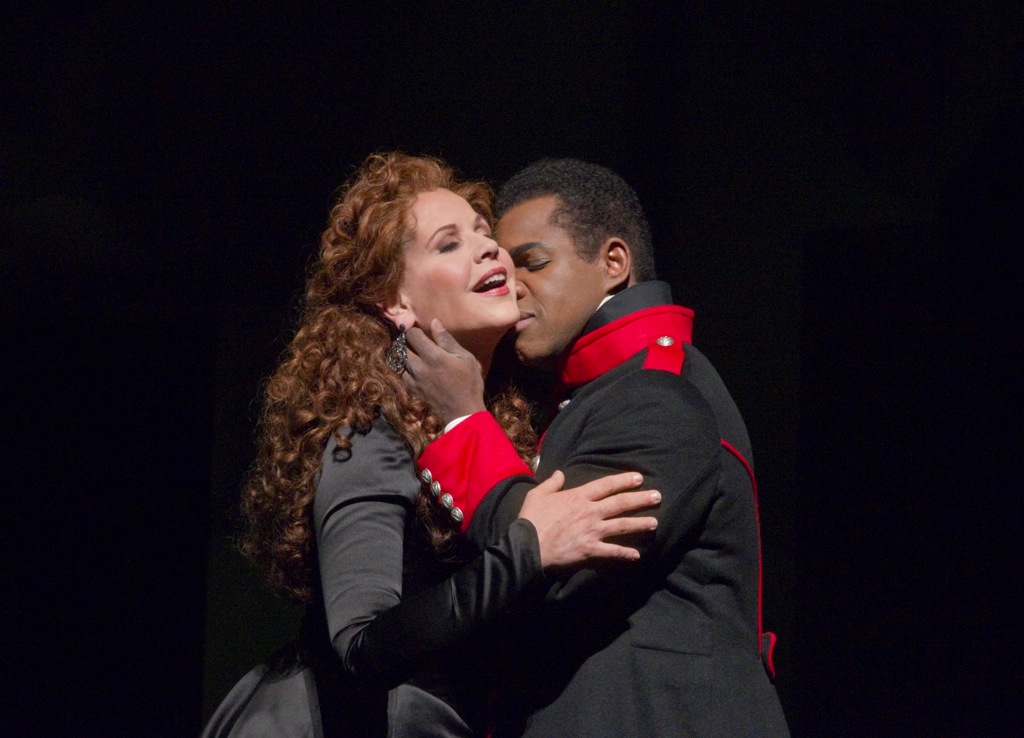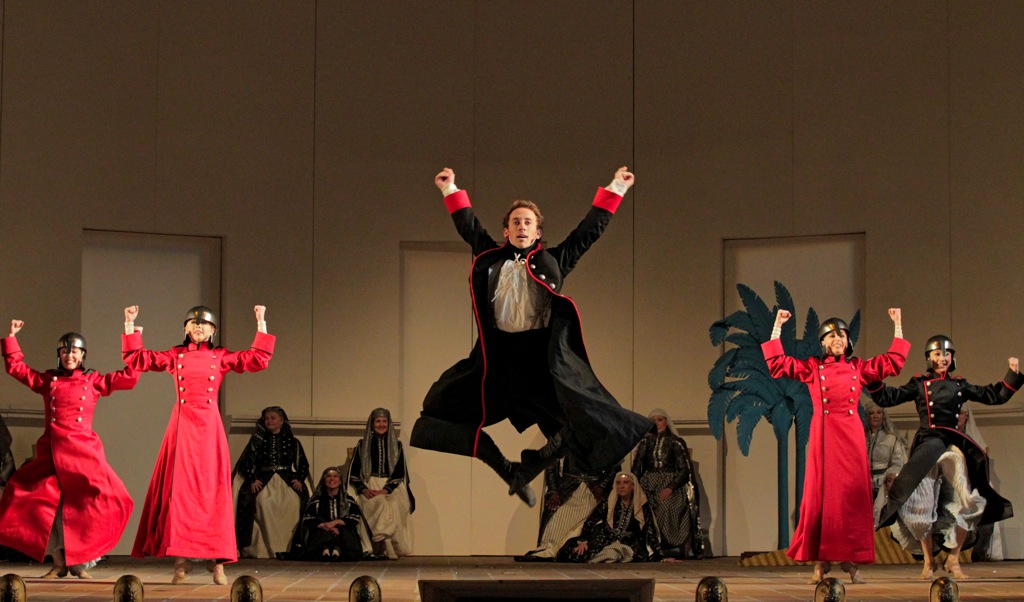Met’s belated “Armida” debut a worthy attempt that fails to make the grade

Renée Fleming as Armida and Lawrence Brownlee as Rinaldo in the Metropolitan Opera's "Armida." Photo: Ken Howard
On my way to Lincoln Center for the Metropolitan Opera’s first ever performance of Rossini’s Armida starring Renée Fleming, a tune kept running through my mind from Semiramide, the opera that—until the curtain went up on Armida Monday night—had been the only Rossini opera seria performed by the Met in my lifetime. In a just world, the earlier endeavor, which belatedly showcased Marilyn Horne in an acclaimed role and surrounded her with singers that likewise did Rossini proud, would have unleashed a veritable Rossini stampede.
As it turned out, nearly two decades went by since Horne first stepped on the Met stage to deliver the entrance aria Ah! Quel giorno ognor rammento. It would be nice to say that the new Armida was worth the wait. But unfortunately, while the show can be judged worthy in virtually all respects, it falls short of true excellence just about as consistently.
The problems begin with the work itself, which, like dozens of operas before it, treats the story of the Saracen sorceress Armida and her amorous entanglement with Rinaldo, a Christian knight in the Crusades. But Armida is no Semiramide. The nine serious operas Rossini wrote for the Teatro San Carlo in Naples—of which Armida is the third—constitute a remarkable achievement about which we ought to know more. But the creative use of musical form, often heralded as one of the strengths of these operas, does not pay particularly rich dividends in Armida. Interestingly, only two characters—and neither of the two leads—have traditional double arias, but what replaces them is not always cogent. Many in the Met audience were surely surprised that so much of the middle act is given over to ballet. And much of the long first act is devoted to a subplot involving the killing by Rinaldo of his rival Gernando, which has little if anything to do with what follows.
But blame cannot be directed primarily at Rossini, whose music is, after all, pretty wonderful, or even at Mary Zimmerman, who directs her third production of Peter Gelb’s Met administration (more than any other producer) after two misfires—Lucia di Lammermoor and La Sonnambula. For the latter, Zimmerman apparently proposed a “traditional” staging but was prodded by the soprano Natalie Dessay into something more daring, with results that were almost universally disliked.
Not surprisingly, then, Armida is closer in approach to Zimmerman’s less radical Lucia. And like Lucia, in which an additional figure taking the form of a ghost turns up, Armida is populated with a couple of unwanted mute characters, include a young female impersonating cupid, who makes a dazzling entrance at the outset from high above. Zimmerman does some good work in directing the principals, but the cupid’s presence supplies a lighthearted, even childish dimension at odds with a drama that Rossini (and so many other composers) took seriously.
Another problem is the Met stage. The designer Richard Hudson’s imposing unit set lit by Brian MacDevitt is a big semi-circular affair with door-like openings through which in Act 1 gleaming buildings, presumably of Jerusalem, could be seen. But it leaves much of the stage exposed, and the expanse of space sometimes swallows what goes on. In Act 3 certain scenes are sung in front of a drop set, which helps.
And then there is Renée Fleming, looking and sounding consistently lovely in the title role. What soprano wouldn’t want to sing Armida? She is the opera’s only female principal and makes a specialty of enchanting men. The three gowns Hudson designed for her, one for each act, ensure a regal demeanor while contributing to the sorceress’s allure. Fleming phrases seductively and her tone is pure and focused. But it lacks brilliance, and her coloratura singing, while never less than assured, fails to dazzle. As a result, the big variations aria in Act 2, D’amor al dolce impero, falls well short of making the impact it ought to, although Fleming was certainly effective in Armida’s desperate attempts later to persuade Rinaldo not to abandon her.
Much has been made about Armida‘s requirement of six tenors. The Met fields six good ones, but you really don’t need that many since roles can be doubled up. (No doubt if someone gets sick during the run, that’s just what will happen.) Lawrence Brownlee adds to his laurels with a smoothly voiced, technically polished and stylistically cultivated portrayal of Rinaldo. But most of the time Rinaldo is Armida’s dupe and never has much of a chance to assert himself.
As the Christian commander Goffredo, John Osborn has one of the opera’s two double arias and dealt with it impressively. José Manuel Zapata, as the ill-fated Gernando, has the other one and was just about as good. Barry Banks and Kobie van Rensburg make a fine pair as the knights Carlo and Ubaldo, who do their best to extricate Rinaldo from Armida’s wiles. Of the tenor roles, Eustazio has the least to do, but Yeghishe Manchuryan, in his Met debut, dealt ably with it. In the music of Armida’s uncle Idraote, Peter Volpe’s handsome bass voice supplied a welcome change of timbre.
I heard a fair amount of grumbling during the second intermission about the ballet, but in fact Graciela Daniele’s choreography effectively deals with its subject matter—the gradual seduction of a warrior by a bevy of nymphs, who end up crowning him with a garland of flowers. This, of course, is just what Armida wants for Rinaldo, who observes the ballet with her.
No complaints about the musical text, whose generous proportions make for a running time (including intermissions) of nearly four hours under Riccardo Frizza’s leadership. There are a number of interesting instrumental effects, such as the unusual wind writing at the outset and prominence of solo cello (looking forward to William Tell). Frizza showed a nice rapport with the singers but through phrasing and articulation could have given the music more character. Just another factor that prevents this Armida from achieving real success.
Armida runs through May 15 (HD broadcast May 1). http://metoperafamily.org/metopera.

Posted Apr 17, 2010 at 1:41 am by Chevalier Dupin
Very interesting review, but I would like to inform you that the characters of Love and Revenge are actually written into the score and were present in Rossini’s realization of the story: they are not some extraneous fabrication by the director as so many people seem to think.
Posted May 03, 2010 at 3:05 pm by Gil Deane
Fleming sings the notes…if you want to hear someone sing t he music, listen to Maria Callas on You Tube
Posted May 23, 2010 at 11:12 am by Mary Lee Ferry
The singing in Armida was glorious. In my opinion, Renee Fleming is the best! Her voice has a beautiful, milky quality, and her range is remarkable.
The first act of this opera was too long, and should have been edited. The rest was wonderful, including the ballet of Act 2.